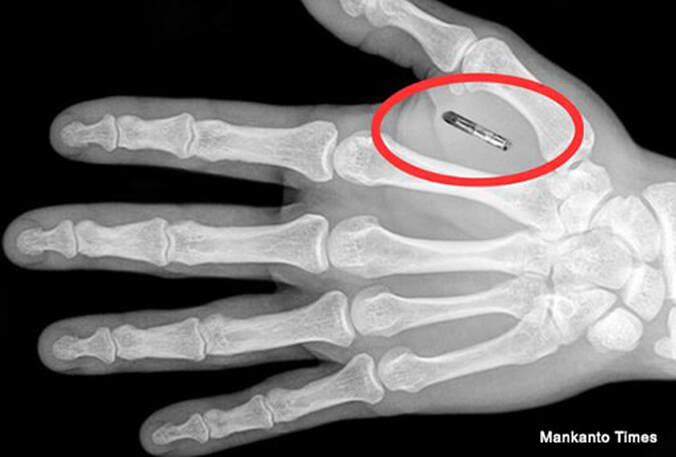32M is the first U.S. company to “chip” its employees. Workers who agree to the anatomical upgrade, have a grain-sized microchip implanted under the skin on the back on their hand, between the index finger and thumb. A CNBC video gives a great visual of the chip and how it’s injected.
Not long after the company had made the chip available, 50 of 80 employees had volunteered for the insertion. Software engineer Sam Bengtson explained his reason for accepting the chip:
“It was pretty much 100 percent yes right from the get-go for me. In the next five to 10 years, this is going to be something that isn’t scoffed at so much, or is more normal. So I like to jump on the bandwagon with these kind of things early, just to say that I have it.”
For employees, the value of the implant is mainly convenience. The RFID-enabled chip allows workers to swipe into buildings, pay for food in cafeterias, and log onto computers, all with the wave of a hand—no need to pull-out ID cards or type in passcodes.
So, what are the benefits of this technology to 32M? The main advantage would seem to be that the technology relates directly to the company’s product. The B2B firm sells self-service micro-markets to other organizations: miniature convenience stores where employees can purchase food and drink without anyone helping them. Although there are other ways for shoppers to “check-out,” an implanted chip may be the way people buy potato chips in the future.
Another reason for 32M chipping its own employees could be that it’s trying to better meet their wants and needs, which is sometimes called “internal marketing.” The basic premise is that a firm needs satisfied employees in order to have satisfied customers because the former serve the latter.
Perhaps there are also some cost savings that will accrue to 32M, either because the technology will prove cheaper over time than existing security systems or because employees will save time, which means money. Beyond these possible reasons, 32M’s motivation becomes even more speculative. CEO Todd Westby claims that the RFID technology will become the standard for using all manner of security-driven devices, but those are the same employee convenience reasons mentioned above.
It’s interesting that of the many news articles written about this story, none that I’ve read talk about specific benefits for 32M. That curious omission makes it even more tempting to imagine unscrupulous reasons why a company might want to chip its employees.
Along those lines, one of the most compelling concerns the chips present is privacy. For instance, will companies be able to track their chip-toting workers wherever they go? The simple answer is “no” because the chips do not have GPS technology.
That fact, however, doesn’t preclude firms from installing RFID readers throughout their own facilities to see how much time people are spending in the breakroom or how often they’re using the bathroom. Dr. Alessandro Acquisti, a professor of information technology and public policy at Carnegie Mellon University echoes this concern: “Once [the chips] are implanted, it’s very hard to predict or stop a future widening of their usage.” Just like marijuana can be a gateway drug to heroin, companies’ use of embedded RFID chips to track employees’ snack purchases could easily lead to all kinds of other monitoring.
Related to privacy is the issue of security. 32M claims that the chip’s data is "encrypted," but that term has a wide range of meaning, similar to “biodegradable.” Dr. Acquisti explains that encrypted is "a pretty vague term . . . which could include anything from a truly secure product to something that is easily hackable." No information is safe if hackers can crack the encryption key, and shorter encryption keys are easier to decipher than longer ones.
Another concern surrounding the chips is safety. Fortunately, implantation is relatively painless—“Just a little prick” and a “brief sting.” Also, the FDA approved the technology about 13 years ago, which is somewhat reassuring. It’s hard, however, to know the long-term impact of a foreign object placed in the body. Thirteen years is not that long a track-record, especially given limited trials.
Furthermore, what happens when a chip goes bad or becomes obsolete and needs to be replaced? Or, what if an employee leaves to work somewhere else that uses its own RFID chip? There’s also the possibility of other organizations, like airlines and athletic clubs, asking us to insert their own chips into us so they too can track our consumption. Pretty soon people become human pin cushions.
For those and other reasons, it’s good that 32M has made the chips optional: “For employees not prepared to implant a chip in their bodies, the company is offering two other options – the same technology, placed in a wristband or a ring.” One has to wonder, though, how much freedom of choice 32M employees actually have.
How would you feel to be one of only a few people in your office wearing a special wristband or ring? What do those very visible accessories say about you in terms of how much you embrace technology, support your company’s new initiatives, and trust your employer? A strong argument can be made that 32M employees don’t truly have informed consent. In other words, although they may have a fairly good idea of how the chips will be used, their desire to stay gainfully employed can compel them to choose something they don’t really want.
Organizations have to be especially careful when marketing to their own employees. Unlike external customers who can freely tell companies what they like and don’t like, employees usually can’t afford to be so frank. Although the RFID chips may produce some benefits for 32M and its people, asking them to put the tracking devices under their skin is not a fair request; rather, it’s “Single-Minded Marketing.”
Learn more about the Mindful Matrix and Mindful Meter.
Check out Mindful Marketing Ads and Vote your Mind!




 RSS Feed
RSS Feed